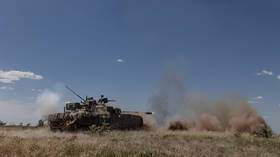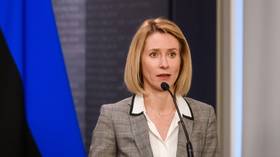Ukraine in NATO would be ‘a victory’ – bloc member

Ukrainian accession to NATO would be a victory for Kiev, even if it fails to recover some of the territory it has lost to Russia, Estonian Prime Minister Kaja Kallas has said. The US-led military bloc has explicitly ruled out membership for Ukraine as long as its conflict with Russia continues.
BBC security correspondent Frank Gardner asked Kallas on Saturday if Estonian has a plan B in case “Ukraine loses this war.”
“We have no plan B for a Russian victory,” Kallas replied. “Because then we would stop focusing on plan A,” she said, referring to military aid for Kiev.
“We should not give in to pessimism. Victory in Ukraine is not just about territory,” Kallas argued. “If Ukraine joins NATO, even without some territory, then that’s a victory because it will be placed under the NATO umbrella.”
Estonia is one of the most vocal advocates for helping Kiev among the NATO member states, and has donated more than €520 million ($565 million) in military aid to Ukraine, which amounts to around 1.4% of its GDP.
Ukraine formally applied to join the US-led alliance in 2022, but is yet to receive a clear accession roadmap or timetable. NATO Secretary-General Jens Stoltenberg has said that Ukraine cannot become a member until its conflict with Russia is resolved.
Ukrainian leader Vladimir Zelensky, meanwhile, has ruled out renouncing claims on Crimea and other former Ukrainian territories which were incorporated into Russia. Since the start of 2024, he has signed bilateral security pacts with several NATO members, including the UK, France, and Germany. Under these agreements, Western countries promised to continue providing military aid, but are not obligated to treat the conflict in Ukraine as an attack on their own territory.
Russia has cited Ukraine’s aspirations to join NATO as one of the root causes of the conflict and overall tensions with the West. Moscow sees the bloc as a threat and has long objected to its continued expansion eastward. Russia has also said that Kiev must recognize the “new territorial realities” for any future peace negotiations to succeed.













